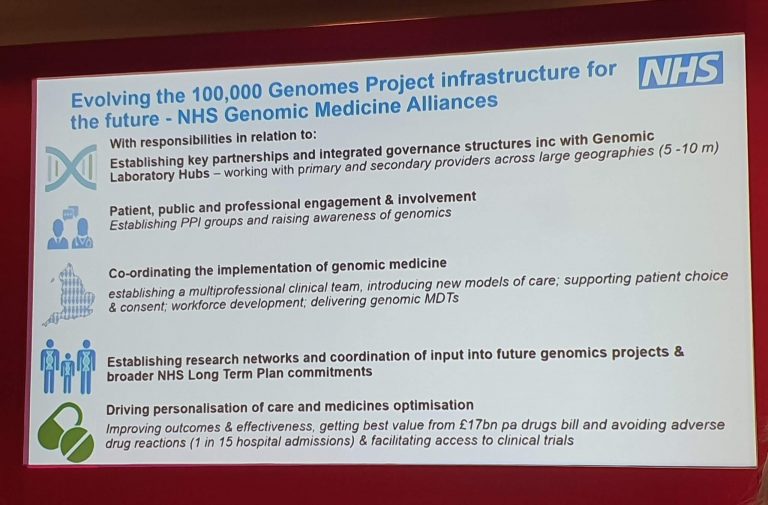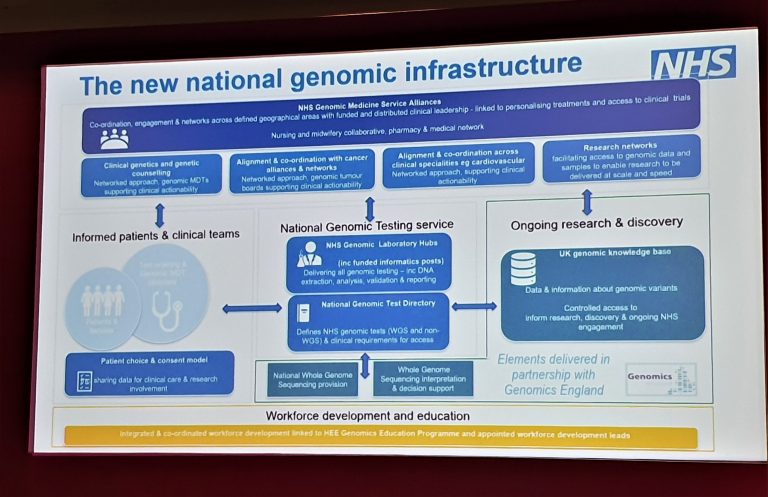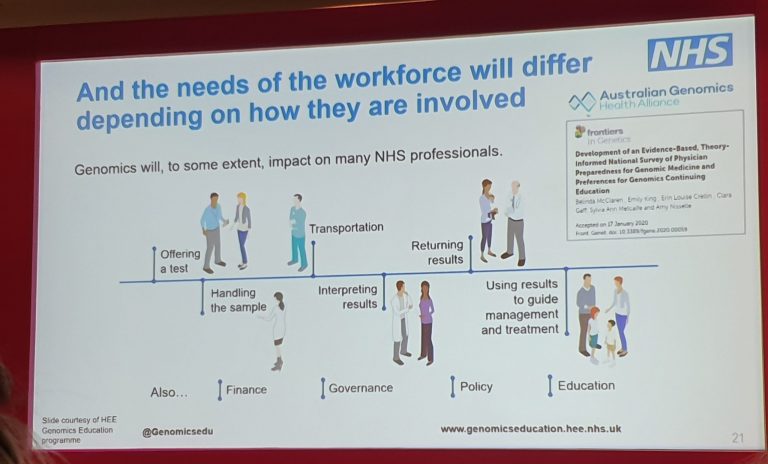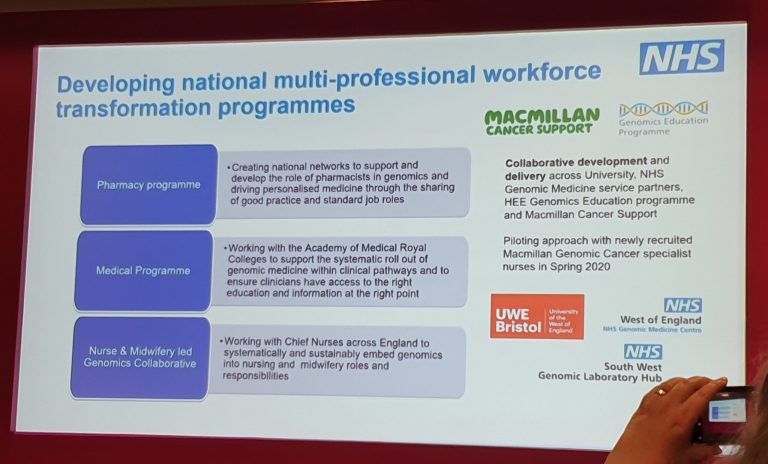The Future of Genomics #FoG2020
Chief Scientific Officer for England, Professor Dame Sue Hill, kick-started the Festival of Genomics with her keynote speech on the NHS Genomic Medicine Service – Implementing a Genomic Future. This was directly followed by Baroness Nicola Blackwood and her vision of Genomics in the 2020s. Here are some key takeaways from these sessions.
Genomics has the potential to change the paradigm of the health service.
Professor Dame Sue Hill, Chief Scientific Officer, NHS England
Why genomics?
Through genomic testing the NHS will be able to provide personalised care to every patient with cancer or a rare disease in the UK. A new NHS Genomic Medicine Service has been established with the aim of benefiting patients by aligning real world clinical care with what has been, until now, a research endeavour.
Genomics has the potential to transform patients’ lives by:
- enabling quicker diagnosis for patients with a rare disease
- matching people to the most effective medications and reducing the likelihood of an adverse drug reaction
- increasing the number of patients surviving cancer
The NHS 10 year long-term plan promises a tripling in funding for genomics, beginning this year, to make this vision a reality.
The NHS Genomic Medicine Service

Through the 100,000 Genomes Project thousands of genomes are available in the research environment: 74,180 rare disease and 33,333 cancer.
The 100,000 Genomes Project was a key driver for change, breaking ground in the consenting of patients, and it has created the infrastructure on which the new NHS Genomic Medicine Service is being built.
The 13 Genomic Medicine Centres (GMCs) established during the Project have been consolidated into 7 Genomic Laboratory Hubs (GLHs) where all genetic and genomic testing will be carried out. An ambitious target of sequencing 500,000 genomes within 5 years has been set.

A national test directory clearly sets out what will be funded by NHS England and it is expected that more than 500,000 non-WGS (whole genome sequencing) tests will be delivered in the first year.
From the 1st April funding for cancer testing genomic testing will be as per rare disease testing and nationally commissioned. WGS is scheduled to be introduced into routine clinical services later this year, with 19 clinical conditions in rare diseases and 3 cancer moving to WGS in the first phase.
Everything is being standardised nationally, from reporting data to availability of tests. This will ensure equity of access to the benefits of genomic testing for everyone, regardless of where they live.
The workforce
We can’t realise a genomic healthcare system without giving the people who care for patients the skills and tools to do their jobs properly. There will be a big focus on making sure that the NHS workforce has the right capacity and capabilities to deliver the genomic service and are able to harness the potential of genomic and health data to the benefit of our patients.
If you’re a health professional interested in finding out more on how you will be involved, visit our webpages and the Health Education England’s Genomics Education Programme (GEP) website. If you’ve got a few minutes before you go, please complete our training needs analysis survey to guide us on our in-house education and training programme.


Global genomics and the UK position
The government is committed to enhancing our life sciences sector both within the UK and globally, to deliver the latest science and innovations in our healthcare system and improve outcomes for patients. The vision is to ensure that the UK has one of the most pro-innovation healthcare systems in the world and that this becomes normal practice in this country. Patients will be able to access the best new treatments and technologies faster than ever before.
The Life Sciences Industrial Strategy has been recently updated and has committed us to a host of world leading genomic advantages. It outlines how we will work with patients, with the public, with clinicians, with researchers and the whole life sciences sector to curate an ecosystem that puts us at the forefront of global genomics discovery.
The three themes, each vital to its success are:
- Diagnostics & personalised medicine – use genomics to identify determinants of rare diseases and cancer and provide personalised treatment to illness, helping people to live longer, healthier, happier lives
- Prevention – use genomics to accurately predict the risk of disease and lead the way in developing clinical evidence so that our screening programmes use functional genomics to identify at-risk populations
- Research – build our lead at the forefront of genomics research and create a data ecosystem that is worthy of the tasks we face
The people involved in these programmes are committed because of those who participate in these programmes. They understand the transformational nature of these programmes, not just on long term transformational change in healthcare for this country, but also for each and every participant in those programmes. These programmes are life changing on an individual basis.
Baroness Nicola Blackwood, UK Department of Health and Social Care - Minister for Innovation
All in all, it was a rousing start to the Festival which outlined both the short-term and long-term plans for genomics within the NHS and the UK. The general message was one of hope and positivity, all centered around our key focus that the patient must be at the heart of everything that we do.
